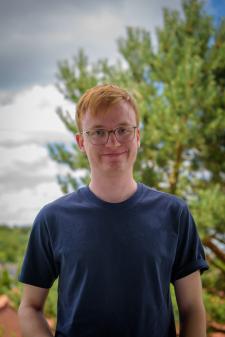Felix Smola
|
Alumnus Position Company Graduated Faculty Degree programme Date of the interview |
 |
What motivated you to pursue a degree in a dual study programme at Rhine-Waal University of Applied Sciences?
I always wanted to do an apprenticeship, but after graduating from secondary school I thought it would be better to go to university, so I looked for a way to do both and found it in a dual study programme. There’s a lot of engineering programmes to choose from in Germany, but studying in English was a priority for me because nearly every company uses English with their international customers. I also looked for something near home, so I eventually decided on the Faculty of Technology and Bionics in Kleve because it ticked all the boxes: I could study mechanical engineering in English and, at the same time, train as a technical product designer in plant and machine construction.
Looking back, what were the advantages and disadvantages of your dual study programme?
The biggest advantage was how theory and practice are closely linked. That’s worth its weight in gold. Another advantage was time: since I completed my two years of vocational training during my four and a half years of study, I “saved” two years compared to doing them one after another. That was a huge plus for me as an applicant because it’s exactly what industry wants: people with real experience and a lot of knowledge to go with it. That’s what a dual study programme offers you. But it also requires a lot of willpower and perseverance. The fact that you have to do more than the average student can be hard. At the start of my programme, for example, I had two days of lectures (from morning to evening) and then three days of on-the-job training every week. Another disadvantage is that you don’t have the entire semester break off, but rather only 30 days of paid holiday a year. But you also have a salary that whole time, which is an advantage, of course. All in all, I would definitely recommend a dual study programme to everyone.
What was the topic of your thesis?
My thesis was a design problem focused on a targeting unit for golf courses that could be used on the driving range so that golfers could practice different trajectories when they hit. It was a project order from an external organisation and a prototype had already been developed by the time I started. Essentially, my job was to find ways to make the prototype both better and cheaper. Another student from our faculty originally began the project during their internship semester, and I was tasked with continuing the work that had been done up to that point. While we couldn’t build a brand new prototype during my thesis project, we were able to lower the cost and the project itself was very hands-on and interesting.
You start working for Ipsen International GmbH in Kleve on 1 August. Tell us about how you got the job.
I originally looked for jobs in design engineering because that’s where I saw myself, and there were six positions in Kleve and the region. I applied for three of these positions: two were in Kleve (one of which was Ipsen) and one in Kranenburg. I had known about Ipsen already because a friend did their vocational training there and only had good things to say about his experience. So I was intrigued going into my interview and my feelings afterwards only grew.
You’ll be working as a design engineer. Do you already know what your job will entail?
I don’t know the exact details yet. But there are essentially two parts to a design engineer’s job: development and implementation. Implementation involves close work with customers and in fabrication. I personally find all aspects of fabrication really interesting. Development involves, naturally, developing new things. There are a lot of interesting tasks here as well.
I’ll definitely be working on different projects and Ipsen usually works with international clients. So I’ll be speaking a lot of English, too.
Looking back at your student years: What tips and advice do you have for our current and future students?
My main advice would be: believe in yourself! If you give up, all your studies are for nothing. So keep going! I didn’t always have the best marks, but when I got a bad mark I decided to just live with it and do better next time. You most likely won’t use everything you’ve learned at university in your career, so if you’re better in some areas and weaker in others, it won’t make or break your chances in a job interview. In my case, for example, my grades didn’t matter at all: it was the practical experience that was most important.
Summarise Rhine-Waal University of Applied Sciences in three words:
I must admit this was the hardest question of all to answer. I kept coming back to two words in particular. First, international. I always experienced HSRW as a very international university, probably due to the fact that the Faculty of Technology and Bionics has a lot of international students. Second, friendly: I was practically never in a situation in which I found a professor unfriendly. As for the third word...”open” comes to mind, maybe because of my memories about how friendly it was at HSRW.
